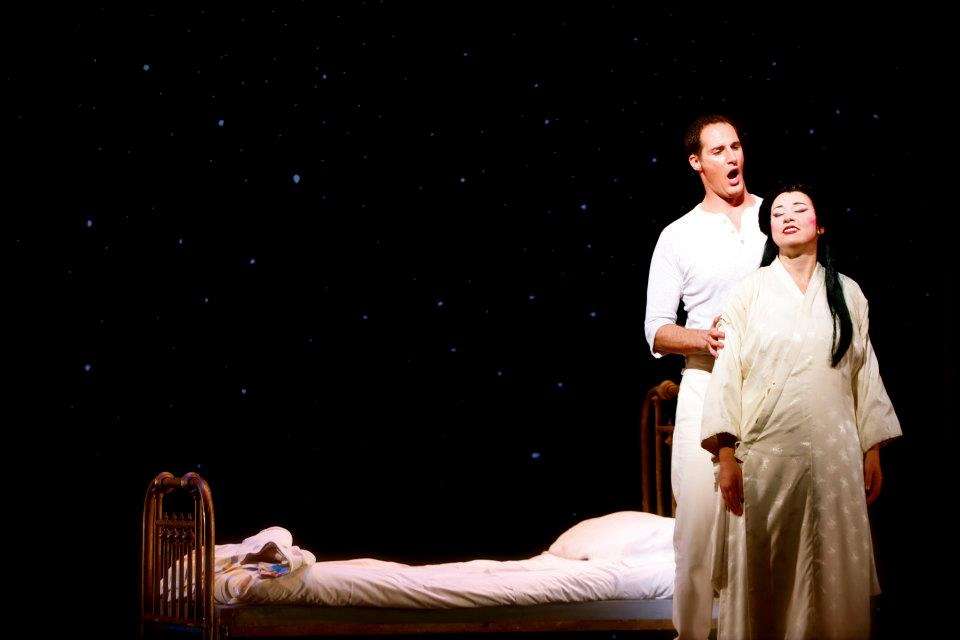|
Back
Sadly, a Sad Opening Palm Beach
Kravis Center for the Performing Arts
12/16/2011 - & December 17, 18, 2011
Giacomo Puccini: Madama Butterfly
Maria Luigia Borsi (Cio-Cio San), James Valenti (Pinkerton), Michael Chioldi (Sharpless), Irene Roberts (Suzuki), Julius Ahn (Goro), Valentin Vasiliu (Bonze), R. Kenneth Stavert (Prince Yamadori), Benjamin Clements (Imperial Commissioner), Jesse Enderle (Official Registrar), Shirin Eskandani (Kate Pinkerton)
Palm Beach Opera and Chorus, Greg Ritchie (chorus master), Bruno Aprea (conductor)
Ron Daniels (director), Michael Yeargen (scenic and costume design), Steven Strawbridge (lighting design)

J. Valenti & M. L. Borsi (© Julius Ahn)
It is refreshing to be reminded of oneís first exposure to an opera you have grown to love. I remember mine for Madama Butterfly was seeing Frank Corsaroís famous production on Live from Lincoln Center in, I believe, 1982. And as much as I have savored many performances of it since then, nothing can replace that intensity. Now the pleasure comes from exploring the details and nuances Puccini gave us. This is enough to keep us busy for a long time though too much of this concentration should not undermine the immediate enjoyment of one of musical theatreís most beloved works.
Palm Beach Operaís season opener, originally created for San Francisco Opera in 1997, makes it clear why it is essential to have a good first experience with an opera. This time I am afraid a newcomer to opera might be turned off and see the medium as hokey. The production is a very bad one. Silly symbolism about Pinkertonís bed, projections that looked dated probably when the production was original, and the ever-present blood red lighting design that was overdone probably 50 years ago are just a few things that might create guffaws. The set makes one think of the Polka Saloon more than anything Japanese; and those screens; would they just stop moving those screens; and on top of that with supers wearing what look like charcoal grey beekeepers outfits. There is so much movement in this production that we donít get much of a chance to concentrate on the principals. Poor Kate Pinkerton is even required to upstage the trio, I guess so that we will realize that it is her presence that has caused this situation; get it? And though we hear Pinkertonís offstage cry at the end, he never makes an entrance. I guess it is to emphasize that he is a coward; get it? Never mind that his re-arrival is in the stage direction and without it nine-tenths of the endingís impact is robbed. One could go on and on about what is wrong here but if the cast truly gets it, then they can overcome directorial shenanigans.
Unfortunately this is not the case, although several of the cast members are excellent. James Valenti is a Pinkerton beyond anything one gets nowadays. Tall, handsome, and a gorgeous voice is a good combination. He seems to perform this role quite often which is really to his credit for as most tenors build bigger careers they tend to drop Pinkerton because he does not have a lot of stage time and is not very sympathetic. But with Valenti, the role seems bigger and more compelling; what a shame the directorís contempt for the lieutenant sabotages him. Valenti could have given credence that Pinkerton was victim of his own game; probably what the librettist and composer had in mind. But does that matter? Michael Chioldi is a lovely Sharpless with all the necessary compassion and a strong voice. Irene Roberts is an especially dignified Suzuki with a beautifully rounded tone that it is always on target. Goro is one of operaís often under-appreciated character roles, but the nasty little devil is essential to this tale. Julius Ahn sings him powerfully and plays him perfectly, devoid of charm.
But a performance of Madama Butterfly succeeds or fails not because of its production design or secondary cast members but by its Cio-Cio San. Maria Luigia Borsi can deliver the big sound when necessary but that is just a tiny bit of what this character requires. From the moment she makes her entrance there is a shrillness that prevents us from ever becoming intimate with this most sweet of heroines. The child bride must not sound like she could be the groomís mother-in-law. The tone for Lady Macbeth, Turandot or Elektra is not the one for a 15-year old innocent who has convinced herself that she is marrying a man who loves her as much as she loves him. Cio-Cio San goes through a couple big changes; but if we donít hear them, then we havenít really experienced this opera. Perhaps Ms. Borsi had a bad night, but it is more likely that this is a dream role she should let go of.
Bruno Aprea as always, led a subtle and sensitive reading of the score. It has become the standard today to perform Acts Two and Three without an intermission, but it doesnít work in the operaís favor. The audience deserves a break after the heightened dramatics of the second act but in the era of under and out, who cares what works best for the drama.
So unfortunately Palm Beach Opera didnít get off to a good start. But as this company has shown in the past, this is not the rule so letís remember the few pluses that were here and hope they get back on track with their next venture.
Jeff Haller
|